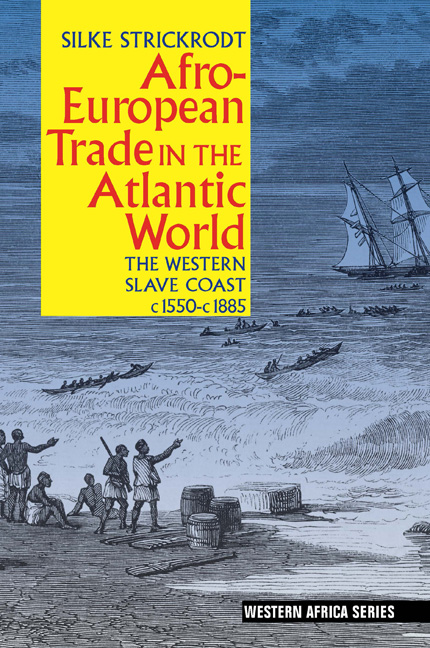Book contents
- Frontmatter
- Dedication
- Contents
- List of Maps
- List of Abbreviations
- Acknowledgements
- Map
- Introduction
- 1 The regional setting
- 2 The Atlantic connection: Little Popo & the rise of Afro-European trade, c.1600 to 1702
- 3 The era of the warrior kings: 1702 to 1772
- 4 The era of the traders: 1772 to c.1807
- 5 Disintegration & reconstitution: Political developments, 1820s to 1870s
- 6 From slaves to palm oil: Afro-European trade, c.1807 to 1870s
- Epilogue: The colonial partition & its consequences, 1870s to c.1900
- Bibliography
- Index
3 - The era of the warrior kings: 1702 to 1772
Published online by Cambridge University Press: 05 May 2015
- Frontmatter
- Dedication
- Contents
- List of Maps
- List of Abbreviations
- Acknowledgements
- Map
- Introduction
- 1 The regional setting
- 2 The Atlantic connection: Little Popo & the rise of Afro-European trade, c.1600 to 1702
- 3 The era of the warrior kings: 1702 to 1772
- 4 The era of the traders: 1772 to c.1807
- 5 Disintegration & reconstitution: Political developments, 1820s to 1870s
- 6 From slaves to palm oil: Afro-European trade, c.1807 to 1870s
- Epilogue: The colonial partition & its consequences, 1870s to c.1900
- Bibliography
- Index
Summary
The period between 1702 and 1772 was defined by the intrusions of Akwamu and Dahomey into the Slave Coast, resulting in the dislocation of communities and the spread of warfare and banditry in the region. Little Popo played an active role in this warfare, consolidating its position in the region vis-à-vis its rivals Anlo and Dahomey. This was the era of the warrior kings, epitomized by Ashampo (c.1737–1767) who was a very successful warrior. However, the relationship between Ashampo and the European traders was often problematic, illustrating the complex relationship between warfare and the Atlantic slave trade.
Akwamu power east of the Volta
1702 marks the beginning of major involvement by Akwamu in the politics of the western Slave Coast. As discussed above, in 1700 Little Popo had used the opportunity of Akyem attacks against Akwamu to drive the Adangme out of Keta. However, in the same year the Akwamu ruler, Ado, succeeded in appeasing Akyem with a handsome payment and soon afterwards his attention returned to the region east of the Volta river. According to Wilks, this was part of Ado's imperialistic projects of territorial expansion to the east. In mid-February 1702 he launched a major military campaign, in the course of which Akwamu control was re-established in the Keta area and, in mid-April, Little Popo was overrun. The king of Little Popo, his subjects and the Adangme fled to Allada. The Akwamu forces then continued to Hueda, with whom they were believed ‘to have common cause.’ They remained there until a threat from Denkyira against their homeland prompted their return west of the Volta at the end of June. However, it appears that Akwamu stationed or soon afterwards sent an occupying force east of the river. In April 1705 it was reported that an army of ‘already 8 to 9,000 men’ under a commander named Dondo was established near Keta.
- Type
- Chapter
- Information
- Afro-European Trade in the Atlantic WorldThe Western Slave Coast, c. 1550–c.1885, pp. 102 - 133Publisher: Boydell & BrewerPrint publication year: 2015



